Death in Oslo Read online
DEATH IN OSLO
ANNE HOLT spent two years working for the Oslo Police Department before founding her own law firm and serving as Norway’s Minister for Justice during 1996–1997. Her first book was published in 1993 and she has subsequently developed two series: the Hanne Wilhelmsen series and the Johanne Vik series. Both are published by Corvus.
ALSO BY ANNE HOLT
THE JOHANNE VIK SERIES:
PUNISHMENT
THE FINAL MURDER
FEAR NOT
THE HANNE WILHELMSEN SERIES:
THE BLIND GODDESS
BLESSED ARE THOSE THAT THIRST
DEATH OF THE DEMON
THE LION’S MOUTH
DEAD JOKER
WITHOUT ECHO
THE TRUTH BEYOND
1222
DEATH IN OSLO
Anne Holt
Translated by Kari Dickson
First published in the English language in Great Britain in 2009 by Sphere,
an imprint of Little, Brown Book Group.
This edition published in 2011 by Corvus, an imprint of Atlantic Books Ltd.
Originally published in Norwegian as Presidentens valg in 2006
by Piratforlaget AS, Postbooks 2318 Solli, 0201 Oslo.
Published by agreement with the Salomonsson Agency.
Copyright © 2006, Anne Holt.
Translation copyright © 2009, Kari Dickson.
The moral right of Anne Holt to be identified as the author of this work has been asserted in accordance with the Copyright, Designs and Patents act of 1988.
All rights reserved. No part of this publication may be reproduced, stored in a retrieval system, or transmitted in any form or by any means, electronic, mechanical, photocopying, recording, or otherwise, without the prior permission of both the copyright owner and the above publisher of this book.
This is a work of fiction. All characters, organizations, and events portrayed in this novel are either products of the author’s imagination or are used fictitiously.
1 3 5 7 9 10 8 6 4 2
A CIP catalogue record for this book is available from
the British Library.
Ebook ISBN: 978-0-85789-435-9
Paperback ISBN: 978-1-84887-615-6
Printed in Great Britain.
Corvus
An imprint of Atlantic Books Ltd
Ormond House
26-27 Boswell Street
London WC1N 3JZ
www.corvus-books.co.uk
Table of Contents
Cover
Title Page
Copyright
Thursday 20 January 2005
I
II
III
IV
Monday 16 May 2005
I
II
Tuesday 17 May 2005
I
II
III
IV
V
VI
VII
VIII
IX
X
XI
XII
XIII
XIV
Wednesday 18 May 2005
I
II
III
IV
V
VI
VII
VIII
IX
X
XI
XII
XIII
XIV
XV
XVI
XVII
XVIII
XIX
XX
XXI
XXII
XXIII
XXIV
XXV
XXVI
XXVII
XXVIII
XXIX
XXX
XXXI
XXXII
Thursday 19 May 2005
I
II
III
IV
V
VI
VII
VIII
IX
X
XI
XII
XIII
XIV
XV
XVI
Friday 20 May 2005
I
Author’s postscript
To Amalie Farmen Holt,
my champion,
the apple of my eye, who is growing up
THURSDAY 20 JANUARY 2005
I
I got away with it. The thought made her pause a moment. The old man in front of her lowered his eyes. His ravaged face was turning blue in the January cold. Helen Lardahl Bentley took a deep breath and finally echoed the words the man had asked her to repeat:
‘I do solemnly swear . . .’
Three generations of deeply religious Lardahls had worn illegible the print in the century-old leather-bound Bible. Well hidden behind the Lutheran façade of success, Helen Lardahl Bentley was in fact a sceptic, and therefore preferred to take the oath with her right hand resting on something she at least could wholeheartedly believe in: her own family history.
‘. . . that I will faithfully execute . . .’
She tried to hold his eye. She wanted to stare at the Chief Justice, just as everyone else was staring at her – the enormous crowd that stood shivering in the winter sun. The demonstrators were too far from the podium to be heard, but she knew they were chanting, ‘Traitor! Traitor!’ over and over, until the words were drowned out by the steel doors of the special armoured vehicles that the police had rolled into position early that morning.
‘. . . the office of the President of the United States . . .’
The whole world was watching Helen Lardahl Bentley. They watched her with hate or admiration, with curiosity or suspicion, and perhaps, in the quieter corners of the world, with indifference. For those few seemingly never-ending minutes, she was at the centre of the universe, caught in the crossfire of hundreds of TV cameras, and she must not, would not think about it.
Not now, not ever.
She pressed her hand even harder on the Bible and lifted her chin a touch.
‘. . . and will, to the best of my ability, preserve, protect and defend the Constitution of the United States.’
The crowd cheered. The demonstrators were removed. The guests on the podium gave her congratulatory smiles, some heartfelt, some reserved. Friends and critics, colleagues, family, and the odd enemy who had never wished her well all mouthed the same word, silently or with loud joy: ‘Congratulations!’
Again she felt a flicker of the fear she had repressed for over twenty years. And then, only seconds into her office as the forty-fourth president of the United States of America, Helen Lardahl Bentley straightened her back, ran a determined hand through her hair, and looking out over the crowd, decided once and for all:
I got away with it and it’s time I finally forgot.
II
The paintings were certainly not beautiful. He did not care for one in particular. It made him feel seasick. When he leant in close to the canvas, he saw that the wavy yellow and orange strokes had cracked into an infinite web of tiny fine lines, like camel dung in the baking sun. He was tempted to stroke his fingers over the grotesque, screaming mouth, but he didn’t. The painting had already been damaged in transport. The railings to the right of the agonised figure now had a sad fringe of threads that curved out into the room.
Getting someone to repair the large tear was out of the question, as it would require an expert. And the very reason that these paintings were now hanging in one of Abdallah al-Rahman’s more modest palaces on the outskirts of Riyadh was that he always avoided experts, whenever possible. He believed in honest handicraft. He had never seen the point in using a motor saw when a simple knife would do. The paintings had been stolen from a poorly secure
d museum in the Norwegian capital. He had no idea who had stolen them or who had handled them on their journey to this windowless gym. He didn’t need to know who these petty criminals were; they would no doubt end up in prison in their respective countries without being able to say anything of any real consequence as to the whereabouts of the paintings.
Abdallah al-Rahman preferred the female figure, though there was something repulsive about her too. Even after more than sixteen years in the West, ten of which he had spent in prestigious schools in England and the US, he was still disgusted by the woman’s bare breasts and the vulgar way in which she offered herself up, indifferent and licentious at the same time.
He turned away. All he had on was a pair of wide white shorts. He stepped back up on to the treadmill, barefoot, and picked up the remote control. The belt accelerated. Sound was coming from the speakers on either side of the colossal plasma TV screen on the opposite wall:
‘. . . protect and defend the Constitution of the United States.’
He simply could not understand it. When Helen Lardahl Bentley had been a senator, he had been impressed by the woman’s courage. Having achieved the third highest grades in her year at the prestigious Vassar College, the short-sighted, plump Helen Lardahl had then fast-tracked to a PhD at Harvard. By the time she was forty, she was well married and had been made a partner in the sixth largest law firm in the US, which in itself demonstrated extraordinary competence and a healthy dose of cynicism and intelligence. She was also slim, blonde and without glasses, which was smart too.
But to stand as presidential candidate was downright arrogant.
And now she had been elected, blessed and sworn in.
Abdallah al-Rahman smiled as he increased the speed of the treadmill with one push of a button. The hard skin on the bottom of his feet burned on the rubber belt. He increased the speed again, right up to his pain threshold.
‘It’s just incredible,’ he groaned in perfect American, secure in the knowledge that no one in the whole world would hear him through the metre-thick walls and the triple-insulated door. ‘She actually thinks she’s got away with it!’
III
‘An historic moment,’ Johanne Vik said, and folded her hands, as if she felt obliged to say a prayer for the new president of the United States. The woman in the wheelchair smiled, but said nothing.
‘No one can say that that isn’t progress,’ Johanne continued. ‘After forty-three men in succession . . . finally a female president!’
‘. . . the office of the President of the United States . . .’
‘You have to agree that it’s quite something,’ Johanne insisted, her eyes glued to the TV screen again. ‘I actually thought they’d elect an Afro-American before they accepted a woman in office.’
‘Next time round it will be Condoleezza Rice,’ the other woman said. ‘Two birds with one stone.’
Not that that would be much progress, she thought to herself. White, yellow, black or red, man or woman, the post of American president was male, no matter what the pigmentation or sex of the person was.
‘It’s not Helen Bentley’s feminine qualities that have got her to where she is,’ she said slowly, bordering on disinterested. ‘And definitely not Condoleezza Rice’s black heritage. Within four years they cave in. And that’s neither minority-friendly nor feminine.’
‘That’s pretty—’
‘What makes those women impressive is not their femininity or their slave heritage. They’ll milk it, of course, for all it’s worth. But what’s really impressive is . . .’
She grimaced and tried to sit up straight in the wheelchair.
‘Is something wrong?’ Johanne asked.
‘No. What is impressive is that . . .’
She braced her arms against the armrests, lifted herself and twisted her body slightly closer to the back of the chair. Then she absent-mindedly smoothed her sweater down over her chest.
‘. . . they must have decided bloody early on,’ she said finally.
‘I don’t understand . . .’
‘To work so hard. To be so clever. Never to do anything wrong. Never to make mistakes. Never, never to be caught with their trousers down. In fact, it’s totally unbelievable.’
‘But there’s always something . . . some little secret . . . Even the deeply religious George W had—’
The woman in the wheelchair lit up with a sudden smile and turned towards the living room door. A small girl of about eighteen months peeked guiltily round the door. The woman held out her hand.
‘Come here, sweetheart. You should be asleep.’
‘Does she manage to get out of the cot by herself?’ Johanne asked with some concern.
‘She goes to sleep in our bed. Come here, Ida!’
The child padded over the floor and let herself be lifted up on to the woman’s lap. Her black hair curled over her round cheeks and her eyes were ice blue, with a clear black ring round the iris. The little girl gave the guest a shy smile of recognition and then snuggled down.
‘It’s strange that she looks so like you,’ Johanne said, leaning forward and stroking the girl’s soft cheek with the back of her hand.
‘Only the eyes,’ the other woman replied. ‘It’s the colour. People are always deceived by the colour. Of the eyes.’
Once again they were silent.
In Washington DC, the people exhaled grey steam in the harsh January light. The Chief Justice was helped down from the podium; from the back he looked like a sorcerer as he was led gently indoors. The newly elected president was bare-headed and smiled broadly as she pulled her pale pink coat closer.
In Oslo, evening was advancing stealthily outside the windows in Krusesgate and the streets were wet and free of snow.
An odd-looking character came into the large living room. She limped, dragging one foot behind her, like the caricature of a villain in an old-fashioned film. Her hair was tired and thin and looked like a bird’s nest. Her legs resembled two pencils and went straight down from under her apron into a pair of tartan slippers.
‘That girl should’ve been in her bed ages ago,’ she muttered without saying hello. ‘Nothin’ gets done right in this house. She should sleep in her own bed, I’ve said it a thousand million times. Come over here, my princess.’
Without waiting for the woman in the wheelchair or the little girl to respond, she scooped the child up on to her difficult hip and limped back the way she had come.
‘Wish I had a woman-who-does like her,’ Johanne sighed.
‘It has its advantages.’
They sat in silence again. CNN switched between various commentators, interspersed with clips from the podium, where the elite gathering of politicians had admitted defeat in the face of the cold and were leaving to prepare themselves for the greatest swearing-in celebrations the US capital had ever seen. The Democrats had achieved their three goals. They had beaten a president who was up for re-election, which was a feat in itself. They had won by a greater margin than they had dared to hope for. And they had won with a woman at the helm. None of these facts were to be underplayed. Pictures of Hollywood stars who had already arrived in town or who were expected in the course of the afternoon flickered on the screen. The entire weekend was to be filled with celebrations and fireworks. Madam President would go from one party to the next, receiving praise and giving endless thanks to her helpers, and would undoubtedly change into an array of outfits along the way. And in between it all, she would reward those worthy of reward with posts and positions, compare campaign efforts and financial donations, assess loyalty and measure ability, disappoint many and please a few, just as forty-three men had done before her in the course of the nation’s 230 years of history.
‘Do you think you can sleep after something like that?’
‘Sorry?’
‘Do you think she’ll be able to sleep tonight?’ Johanne asked.
‘You are funny.’ The other woman smiled. ‘Of course she’ll be able to sleep. You don’t get
to where she is without sleeping. She’s a fighter, Johanne. Don’t let her neat figure and feminine clothes deceive you.’
When the woman in the wheelchair turned the TV off, they heard a lullaby being sung elsewhere in the flat.
‘Ai-ai-ai-ai-ai-BOFF-BOFF.’
Johanne chuckled. ‘That would frighten the life out of my children.’
The other woman steered the wheelchair over to a low coffee table and lifted up a cup. She took a sip, wrinkled her nose and put the cup down again.
‘I guess I should go home,’ Johanne said, though it sounded like a question.
‘Yes,’ the other woman replied. ‘You should.’
‘Thank you for your help. For all your help over the past few months.’
‘There’s not much to thank me for.’
Johanne rubbed her lower back lightly before pushing her uncontrollable hair back behind her ears and straightening her glasses with a slim index finger.
‘Yes, there is,’ she said.
‘I think you just have to learn to live with it. There’s nothing you can do about the fact that she exists.’
‘She threatened my children. She’s dangerous. Talking to you, being taken seriously, being believed . . . it’s at least made things easier.’
‘It’s nearly a year ago now,’ the woman in the wheelchair continued. ‘It was last year that things were really serious. What happened this winter . . . well, I can’t help thinking that she’s . . . teasing you.’
‘Teasing me?’
‘She triggers your curiosity. You are a seeking person, Johanne. That’s why you do research. Your curiosity is what gets you involved in investigations that you actually want nothing to do with, and that’s what is driving you to get to the bottom of what it is this woman wants from you. It was your curiosity that . . . that brought you here. And it is—’
‘I have to go,’ Johanne interrupted, with a fleeting smile. ‘No point in going through it all again. But thank you all the same. I can see myself out.’
She stayed standing where she was for a moment. She was struck by how beautiful the paralysed woman was. She was slim, almost too thin, with an oval face and eyes that were remarkably like the little girl’s: ice blue, clear, and nearly leached of colour, with a broad black ring round the iris. Her mouth was shapely, with a clearly defined upper lip, surrounded by delicate, beautiful wrinkles that indicated that she must be well over forty. She was elegantly dressed in a light blue V-necked cashmere sweater and jeans that were presumably not bought in Norway. A simple, big diamond hung, swinging gently, in the hollow of her neck.

 A Grave for Two
A Grave for Two Dead Joker
Dead Joker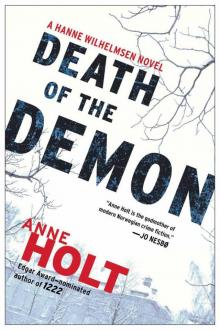 Death of the Demon: A Hanne Wilhelmsen Novel
Death of the Demon: A Hanne Wilhelmsen Novel Punishment aka What Is Mine
Punishment aka What Is Mine Beyond the Truth
Beyond the Truth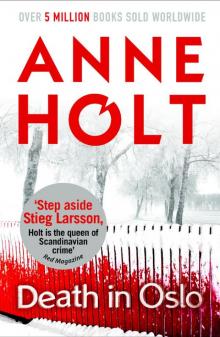 Death in Oslo
Death in Oslo The Blind Goddess
The Blind Goddess What Never Happens
What Never Happens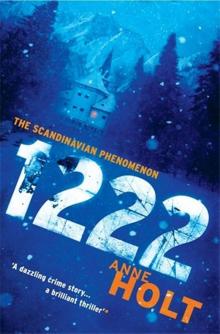 1222
1222 In Dust and Ashes
In Dust and Ashes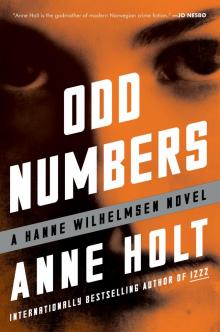 Odd Numbers
Odd Numbers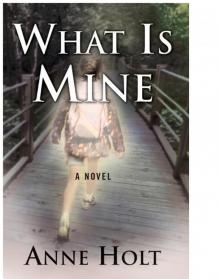 What is Mine
What is Mine What Dark Clouds Hide
What Dark Clouds Hide Blessed Are Those Who Thirst
Blessed Are Those Who Thirst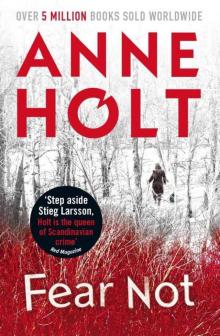 Fear Not
Fear Not No Echo
No Echo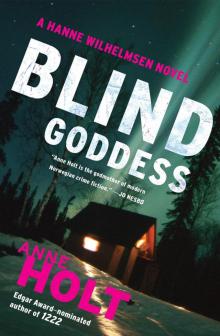 Hanne Wilhelmsen - 01 - The Blind Goddess
Hanne Wilhelmsen - 01 - The Blind Goddess